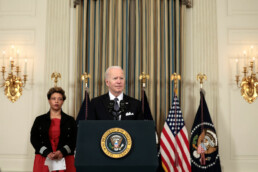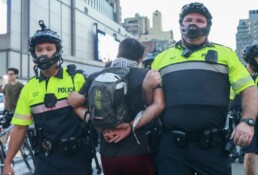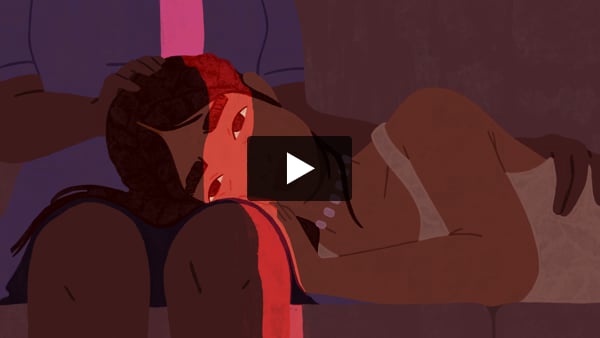Emailing from a coconut tree
 July 23, 2024 Dear Meteor readers, Well, folks, he did it. President Biden has hopped off the campaign trail and is holding the door open for someone else. Did you call it? (We did not.) In today’s newsletter, we’re bringing a little bit of optimism to your inbox as we get accustomed to Vice President Kamala Harris’ new role. Plus a little Olympic news, and a life update from Brittney Griner. Existing in the context of all in which we live, Samhita and Shannon  WHAT'S GOING ONThe politics of optimism: It’s been [checks watch] 52 hours since President Biden announced he was withdrawing from the presidential race, subsequently throwing his support behind Vice President Kamala Harris. And during those two-plus days, something remarkable and strangely unfamiliar took hold of text chains and social feeds everywhere: hope. There have been enthusiastic posts and memes: Coconut emojis were used as an endorsement, referencing her mother’s line, “You think you just fell out of a coconut tree?” And Charli XCX gave her the ultimate Gen Z plug, calling her “brat.”  A VERY ENTHUSIASTIC VOTER AT A RALLY IN SAN FRANCISCO YESTERDAY. (VIA GETTY IMAGES) But the joy isn’t just meme-deep. Over the last two days, people have mobilized, and money has followed. In a call led by Win With Black Women on Sunday night, 44,000 people joined and raised 1.5 million dollars. The next night, Win With Black Men assembled and raised another cool 1.3 million. And white women may be organizing their own call next. All told, the first 24 hours of the Harris campaign raised a record $81 million, which her campaign said “represents…the kind of grassroots energy and enthusiasm that wins elections.” None of that erases the concerns many voters may have about Harris—both those based in reality (her past in law enforcement) and those that are more openly sexist (like the argument that she lacks charisma or the horror that she is childless or the claim that her beating Trump is a “fiction”).  HARRIS AT AN ICE CREAM SHOP WITH HER NEICES. DO YOU THINK SHE ORDERED COCONUT? (VIA GETTY IMAGES) But right now, the palpable excitement and energy her candidacy has engendered feels propulsive, whether you agree with her policies or not. After all, Harris has inherited an enormous political mess. She is tasked with saving the party from the brink of disaster—and to win, she has to do something the party has failed to do so far: present a unified message that quickly galvanizes people and alleviates their anxieties. She’ll have to defend her stances on abortion, the economy, student debt, and the war in Gaza. (It’s impossible to look at the position she’s in and not think just a little bit about the “glass cliff” phenomenon, in which women are handed CEO roles only once a company is about to go off the rails.) Against that backdrop, we need a little of this enthusiasm. Optimism and hope are, themselves, political tools, especially when people feel the odds are insurmountable. They give us a reason to believe, a reason to fight. As the climate writer and futurist Alex Steffen writes, “Where no one believes in a better future, despair is a logical choice, and people in despair almost never change anything. But introduce intelligent reasons for believing that action is possible, that better solutions are available, and that a better future can be built, and you unleash the power of people to act out of their highest principles.” It can be easy to forget that in the early days of his campaign, some argued that Barack Obama was a long shot: unelectable, too young, and unprepared. Instead, young people quit their jobs to door-knock, folks phone-banked in earnest, and we saw the greatest voter turnout we had seen in decades. It was a historic campaign and, in the end, a historic eight years. The point isn’t that Harris is Obama or that Obama was perfect. The point is just that hope is a very effective tool against apathy and authoritarianism. As long-time reproductive justice leader Loretta Ross told The Cut about the election, “We can’t be only defined by what we’re against…we have to be defined by what world we build and want.” AND:
 CHAPPELL ROAN REMINDING US THE PLANET IS LITERALLY HOT TO GO
 LISTEN UP 🎧Tomorrow morning we’re dropping the first episode of our brand-new podcast, “America, Who Hurt You?” with Sarah Jones! And since we’re all friends here, you get to find out first that in tomorrow’s episode, Sarah Jones will be in conversation with “On Being” host Krista Tippett. And there may be tears. Click the image below to learn more and subscribe wherever you get your podcasts!  FOLLOW THE METEOR Thank you for reading The Meteor! Got this from a friend? Subscribe using their share code or sign up for your own copy, sent Tuesdays and Thursdays.
|
![]()
The Party of the Working "Man"
 July 18, 2024 Evening, Meteor readers, I missed you! Thank you for asking, I did indeed have a great six-week sabbatical launching my new book, The Myth of Making It. I’m grateful to the inimitable and absurdly brilliant Julianne Escobedo Shepherd for holding down the fort with Shannon Melero for all of you. But now, I’m back! And what a week to return to: the aftermath of political violence, the continuing pressure for now-COVID-positive President Joe Biden to step aside as the nominee, and the Republican National Convention in full swing. Maybe I need to take another break. Today, we decode what’s happening at the RNC (we don’t include an investigation into Matt Gaetz’s dermatology routine; we’re better than that), cheer for some historic Emmy nominations, and learn what Black women really think about this year’s upcoming election. Save me, Samhita Mukhopadhyay  WHAT'S GOING ON WELCOME TO THE JUNGLE. (VIA GETTY IMAGES) Ah, the Republican National Convention—where the conservative leaders of our time, dedicated to rolling back as many of our rights as possible, come together to discuss how exactly they will get that done (and try to convince us that the youth is for it). As we anticipate former President Donald Trump’s speech tonight, here are a few takeaways from the RNC thus far: They want to convince us they are the party of the working “man.”J.D. Vance took the stage on night three of the RNC to deliver a bold message to Americans: “We need a leader who is not in the pocket of big business but answers to the working man, union and nonunion alike.” (The word “man” is no accident, since the VP candidate apparently doesn’t believe women should be encouraged to work outside the home.) But for the hard-working men of America, the RNC has spent the last few days making pro-union and pro-labor overtures—which is usually something reserved for the DNC, but here we are. But was Vance talking about paid family leave, a minimum wage, or universal healthcare? No—for the most part, the RNC’s discussion of jobs focused on how immigrants are allegedly taking them. On the first night of the convention, Sen. John James (R-Michigan) told the audience, “Black people were sold on hope; now our streets are rife with crime. Our kids can’t read. And illegals are getting better help from Democrats in four days than we’ve gotten in 400 years.” If you’re wondering what 400 years refers to: Well, we’re pretty sure they’re referring to 1619 when the first slave ship arrived in America, but since the GOP discourages the teaching of that, it’s hard to say for sure.  THIS HARDWORKING AMERICAN MAN IS A FORMER VENTURE CAPITALIST WHOSE FIRST BID FOR OFFICE WAS FUNDED BY PETER THIEL. (VIA GETTY IMAGES) They’ve got the Senate in their sights.As far as the RNC is concerned, the White House is theirs come November. But they want more. They want to flip the Senate and, this week, trotted out seven candidates currently running for Senate. (They were Kari Lake of Arizona, Eric Hovde of Wisconsin, Bernie Moreno of Ohio, Sam Brown of Nevada, Hung Cao of Virginia, Nella Domenici of New Mexico, and Mike Roger of Michigan.) If you’re in those states, we highly recommend this link. Trump haters for Trump!Almost every politician who’s taken the stage over the last three days has, at some point before the convention, either vocally spoken out against Trump or been a subject of the former president’s incredibly public ridicule. And yet there they are, smiling and ignoring their quibbles in order to present a united front to voters. But much like The North, I, too, remember. I remember J.D. Vance calling Trump unfit to be president. I remember Senator Ted Cruz calling Trump a “pathological liar” and warning the entire country that “nominating Donald Trump would be a train wreck.” I also clearly recall Nikki Haley calling Trump unqualified to lead. And considering that a number of conservative politicians (Trump included) are trying to distance themselves from Project 2025, the latest GOP bible, that unity is coming off faker than Marco Rubio’s tan. Donald Trump, convicted criminal? Nah‚ he’s just like us.And one final RNC theme: Trump is a regular ol’ person. Not just any kind of person, but a considerate friend (according to Sarah Huckabee Sanders) and a loving grandpa (according to his teenage grandchild, Kai, who said “A lot of people have put my grandpa through hell and he is still standing”. Girl…be for real.) And who doesn’t want to vote for grandpa? We don’t. We don’t want this grandpa. We’ll take the cat ladies. AND:
 EMMY HOEPFUL, NAVA MAU. (VIA GETTY IMAGES)
 FOLLOW THE METEOR Thank you for reading The Meteor! Got this from a friend? Subscribe using their share code or sign up for your own copy, sent Tuesdays and Thursdays.
|
![]()
Three Questions About Disinformation
 July 16, 2024 Evening, Meteor readers, So, I trust everyone had a relaxing, uneventful, downright mundane weekend void of any alarming or paradigm-shifting news? We wish. Let’s get straight to it. In today’s newsletter, we’re jamming to J.D. Vance’s greatest hits, including his number one single, “Mr. Trump is unfit for our nation’s highest office.” Blast it through the speakers. We’re also asking media critic Jennifer L. Pozner three questions about how to stop the spread of disinformation during violent moments. Is this real life, Shannon Melero  WHAT'S GOING ON JAMES DAVID VANCE. OUR COLLECTIVE NIGHTMARE IN HUMAN FORM. (VIA GETTY IMAGES) J.D. Vance (the D stands for “Don’t let this man in the White House”): As you’ve probably heard by now, Donald Trump has chosen author and Ohio junior senator J.D. Vance as his vice president. There’s already been a bit of ink spilled about Vance and his…policies, if we want to call them that. But what are the thoughts rattling around in his anti-abortion, isolationist, anti-LGBTQIA+, conspiracy theorist, far-right head? Well. He certainly isn’t a fan of women or their bodily autonomy: On abortionIn a local Ohio cable news interview in 2021, when asked if abortion bans should have exceptions for rape or incest, Vance said, “It’s not whether a woman should be forced to bring a child to term, it’s whether a child should be allowed to live, even though the circumstances of that child’s birth are somehow inconvenient or a problem to the society.” A year later, Vance (out loud where people could hear!!) also likened abortion to slavery. Ahead of being announced as the choice for VP, Vance conveniently softened his abortion talking points in an interview with Meet the Press. The entire nation calls bullshit. On domestic violenceIn a 2022 anti-abortion forum, Vance said, “The entire idea that you can discard your husband or your wife like a piece of clothing is one of the most dangerous assaults that we’ve ever seen on the family in this country. If we want children to grow up with healthy, happy lives, we should be reminding them that the most important thing that we can do for our kids is make sure they grow up with a mom and dad at home.” In other words: Domestic violence is not a reason to get divorced. His assertion that children are only going to be healthy and happy if a “mom and dad” are present also underpins his anti-LGBTQ+ stances. On gunsAnd since we all have gun violence at the top of our minds this week, what has Vance said about that? “I think that we have to ask ourselves: What is the real gun violence problem in this country, and are we legislating in a way that solves fake problems? Or solves real problems?” This was in response to a proposed bump-stock ban (which he voted against). As far as solving “real” gun problems, Vance has rejected a number of measures that would make it harder to obtain a firearm and said he was in favor of dismantling the ATF, which (you guessed it) seizes illegal guns. Define real problems, James David. TL;DR: This is not a viable vice presidential candidate; this is a nightmare, and a clear sign that the now-formally-nominated Donald Trump has no plans to modify his far-right stances in a second term. AND:
 THE ONE AND ONLY SHANNEN DOHERTY (VIA GETTY IMAGES)
 Three Questions About...DisinformationLast Saturday was a moment of mass panic. One feminist media critic has ideas about what could have gone differently.BY SAMHITA MUKHOPADHYAY  NO COMMENT. (VIA GETTY IMAGES) When the mass shooting at the Trump rally happened on Saturday, I was unclear how to respond. Disbelief and adrenaline coursed through me, and the moment I logged onto Instagram, the content was flying: everything from earnest (“This is not who we are!”) to snark (“This is why Democrats need access to guns!”) to cries of “It’s a hoax!” As a journalist, I knew this should be a wait-and-see moment, but instead, I was faced with the reality of how quickly unhelpful—and downright untruthful—messaging can spread. What gave me solace was a measured list of media literacy strategies posted by my friend Jennifer L. Pozner, a journalist and long-time media educator with an upcoming graphic novel about critical media literacy. So, I called to ask her to elaborate. What was the first thing you noticed when the news broke about the shooting? Jennifer Pozner: The first piece I saw from a credible outlet was on NPR’s website, and the comments under the story included someone telling NPR it was their fault, another implying that it was staged, and a third laughing at Trump’s bloody ear. Legitimate news reporting is a time-consuming process. During chaotic events, ethical reporters have to vet sources, fact-checkers need to do their best to confirm the story, and they all need to work carefully to ensure that they’re giving the public accurate information. You know what takes no time at all? Bullshit. Bullshit is instantaneous. Rumor, propaganda, bots, and bad actors always pop up right away, flooding the zone with disinformation and conspiracy theories to fill every short-term information vacuum. This is a collective societal problem, but we contribute to it individually when we react without thinking critically… That’s dangerous because disinformation is sticky. When disinformation infuses the immediate narrative, it can be hard to convince people of reality even after the facts have been verified. You had a great social post about what to do instead of posting immediate reactions. Can you summarize what you suggested people do in a moment like this and why? It’s important to wait for verified reporting to establish the facts. And we should denounce political violence without condition—even when the target has often encouraged political violence against his perceived enemies. Don’t share false stories, even to mock them: You may think something is so outrageous no one could possibly believe it, but many do…Those potshots could just end up reinforcing the disinformation to others. Outrageous claims need air to multiply; suffocate conspiracies by depriving them of attention. Debunk, don’t distribute: Share accurate information and analysis in plain language and explain how you know particular falsehoods are untrue (without sharing the original lies themselves). Bad actors (including domestic propagandists, Russian and Chinese troll farms, and money-motivated bot operators) use moments like these to pit Americans against one another and foment hate. Don’t fall into those traps. Lower the volume. Don’t debate those who aren’t engaging in good faith, and moderate your social feeds to block trolls and anyone who seems sketchy from poisoning the dialogue. Remember, everything we say publicly can impact other people and possibly contribute to an escalation of violence or conspiracy (and screenshots are forever). Fears, ugly thoughts, and dark humor are deeply human, and it’s OK to express them. But if we want to avoid doing harm, we should really only share them with our “inside voice”: offline in the context of conversations with trusted friends. What is your take on political violence and how we should and shouldn’t talk about it? I thought this was astute in making the case that attacks on politicians are par for the course in the U.S. Looking to the public record and to history can often provide crucial context, as it does here. The Times usefully reminds us that four U.S. presidents have been murdered, along with at least six serious failed additional assassination attempts. What it doesn’t mention is that while this violence has been aimed at both parties’ heads of state, only Trump and the GOP have been explicitly encouraging political violence against “the other side.” Everyone seems to have forgotten that Trump himself made a not-so-subtle assassination threat/dog whistle against his rival, Hillary Clinton, at a 2016 campaign rally. Many journalists, politicians, and historians have accurately situated Trump and the MAGA movement’s policy agendas, statements, and behaviors as consistent with fascism. It’s a routine project for autocratic regimes to threaten violence against their rivals, discredit the press, encourage the public to distrust truth itself (remember “alternative facts”?), revel in mockery and intimidation of minority groups, and paint reasonable disagreement as tantamount to treason—all of which Trump and his acolytes have done. Now, the GOP wants us to believe that acknowledging the history and workings of fascism is so inflammatory and dangerous it must be the reason a 20-year-old lone gunman shot the former President and killed another rallygoer. All their social media posts and press interviews flogging this point aim to distract from clear fact: America is a nation plagued by mass shootings carried out by angry, young gunmen, and Democrats and progressives have not been the ones calling for political violence.  FOLLOW THE METEOR Thank you for reading The Meteor! Got this from a friend? Subscribe using their share code or sign up for your own copy, sent Tuesdays and Thursdays.
|
![]()
Believe Children.
What we should really be saying about Alice Munro
By Julianne Escobedo Shepherd
Last weekend, Canadian writer Andrea Robin Skinner wrote an intensely personal op-ed about her sexual abuse at the hands of her stepfather—and about how her mother had protected the abuser. Though the violence began when Skinner was 9, she found the courage to tell her mother when she was in her twenties. But her mother “reacted exactly as I had feared she would," Skinner writes, "as if she had learned of an infidelity.” Skinner went on to report her stepfather to the police (he got two years' probation) but never reconciled with her mother before her death. It's a horrible story of sexual abuse and betrayal—but the thing that got the most attention was the name of Skinner's mother: Alice Munro, the celebrated novelist and 2013 winner of the Nobel Prize for literature.
The media response thus far has been primarily about Munro's legacy, with a procession of op-eds about what to do with her books and whether her writing indicated that she was the kind of person who would ignore her daughter's pleas. We've been having these types of conversations for years—the "can we separate art from artist?" conundrum—about cultural icons from Woody Allen to R. Kelly to Picasso. And yes, that’s a mildly interesting question…which also distracts from the most important issue here: Why on god's green earth are adults still dismissing children when they tell them, with an unimaginable amount of courage, about being sexually abused?
Skinner's story is important not because of who her mother is, but because it illuminates disturbing truths about how child sexual assault is dealt with—or not—particularly when family ties seem to complicate the simple act of protecting children. "It seemed as if no one believed the truth should ever be told, that it never would be told, certainly not on a scale that matched the lie," Skinner wrote.
Skinner’s experience is devastatingly common: RAINN estimates that one in every nine girls and one in every 20 boys experiences some form of child sexual abuse before they're 18, though some studies say the statistics are even higher. The ripple effects are lifelong: Once a child experiences sexual abuse, they're much more likely to experience PTSD, depression, or develop symptoms of drug abuse, per RAINN. And ninety-three percent of these children know their abuser, whether a family member, teacher, or some other person in authority—a violation of trust which makes it that much more difficult for them to report the abuse, particularly if their abuser has made threats against other loved ones, a common grooming tactic.
When the abuser is a family member, in particular, the dynamics get even more complicated, even though they hypothetically shouldn't. The American Academy of Child and Adolescent Psychiatry emphasizes that when a child reports their own abuse, it's important for the adult to remain calm and refrain from making judgmental comments, and to assure them they are not to blame—two crucial kindnesses Skinner writes that she wasn't afforded. And though there aren't hard statistics available about the percentage of children who report abuse but aren't believed, judging by the amount of first-person testimonies on the internet, it's unfortunately common. Even Ellen Degeneres experienced this—she was abused by her stepfather and her mom disbelieved her. (Degeneres's mother believes her now, thankfully; in 2019, she released a statement that read, in part, "If someone in your life has the courage to speak out, please believe them.")
We know what some people say: that not every claim is true. And many remember so-called "false memory syndrome"—although that’s not a term or concept officially recognized by reputable psychiatric sources such as the DSM-IV—and the "Satanic day care" panic of the 1980s and '90s, in which children did in fact accuse daycare teachers of mass abuse. (Most saw their convictions overturned.) But the fact is that these instances were and are extremely rare; in fact, like rape, childhood sexual abuse is grossly underreported, with one study identifying that half of childhood abuse survivors never tell anyone, even after they are adults.
That makes what happens when young survivors do tell someone so crucial. “Don’t let your natural and understandable feelings of confusion and doubt override the fact that the perpetrator is always at fault,” writes the National Child Traumatic Stress Network (NCTSN), in its very helpful guide. “If, in the heat of your own pain and distress, you accuse your adolescent of betrayal instead of acknowledging that your child was the victim, he or she may begin to experience dangerous—and potentially damaging—self-doubt.” Reading the NCTSN’s materials, you also understand that given the frequency and prevalence of childhood sexual abuse, it's possible that the person being told has their own traumatic history with abuse, which can complicate their reaction.
Skinner wrote her piece after years of experiencing the ripple effects of being both abused and disbelieved; she began slipping in school and struggled with bulimia. But while her trauma followed her well into adulthood, as it does with many survivors, she eventually got professional help. It's never too late to do that, and there are lots of specific resources for adult survivors, including organizations, like Hidden Water, which follow a restorative justice approach to healing.
What else might help? Erin Merryn, a survivor and children's advocate, has some answers. After being abused as a child—first by a neighbor, then by a family member—she has since spent the last 15 years lobbying legislators around the country to implement Erin's Law, which requires public schools to teach prevention courses to children in school through 12th grade. (It has been adopted in 38 states, with more on the way.) Reporting abuse might be fraught, but signaling to a child that they're being protected from further harm is more important. Most crucially, the child must be believed and treated with gentle care, particularly if they're expected to develop a healthy adult life. And that matters more than any one writer's legacy.
If you or someone you know needs help, contact RAINN here or at 1-800-656-4673.

Julianne Escobedo Shepherd is a writer, culture critic, and editor in NYC. Her first book, Vaquera, about growing up in Wyoming and the myth of the American West, is forthcoming for Penguin.
Will He, Won't He
 July 11, 2024 Good evening, Meteor readers, Do you have a moment to talk about our lord and savior, Arlette Amuli? No, but seriously. I know a lot of you are fans of dating shows, and Amuli is the creator and host of the most riveting dating show I have seen since Blind Date (the original, not the reboot). It’s called Pop the Balloon or Find Love. You can catch it on YouTube and thank me later, especially after you’ve gone through the emotional roller coaster that is “Doctor Elom.” IYKYK. In today’s newsletter, we wade gently into the murky waters of President Biden’s campaign. While some Democrats are standing firmly with him, others are looking over his shoulder to see who might be next (we do have a vice president, right?). Plus, Scarlett Harris talks to writer Emma Specter about her new memoir More, Please, and your weekend reading list. 🧷🎈♥️, Shannon Melero  WHAT'S GOING ONDance of Democrats: The will-he-or-won’t-he saga of President Biden’s 2024 run might feel like a breezy House of the Dragon subplot if only the entire concept of representative democracy in the U.S. weren’t at stake. This week, calls for Biden to step aside for a more viable and virile candidate increased, with multiple Democratic congresspeople weighing in. Even George Clooney, of married-to-Amal fame, wrote an op-ed about how Biden should make way for a new nominee, which is notable since Clooney raised $28 million for Biden just three weeks ago. “We can put our heads in the sand and pray for a miracle in November,” he wrote, “or we can speak the truth.” So far, Biden has doubled down in response to the growing fears over his ability to beat Trump and the Project 2025 army, but there are signs of tiny cracks in his resilience: the New York Times reported today that the campaign is conducting a survey about whether voters might prefer Vice President Kamala Harris at the top of the ticket in a match-up against Trump. And as the Times notes, a lot rests on the (unscripted) news conference Biden is delivering tonight in the wake of the NATO summit: If it goes the way of the debate, party leaders might defect from Biden. (Harris, or Gretchen Whitmer, or Gavin Newsome, or JB Pritzker have all been floated at various times as Biden replacements.) There’s also the question of whether the Democratic Party would have already asked Biden to step aside if VP Harris were white and a man—even though a recent poll showed her chances of beating Trump are better than Biden’s. (Some progressives have even been rallying around the “KHive” on social media, which has been flooded with enthusiastic jokes about loving context and coconut trees.) Either way, the Democratic Party needs to straighten out its shit quick—there are only about 16 weeks until the election, and beating an autocratic rapist felon should simply not be this fraught. Democracy, as the DCCC texts keep reminding me, hangs in the balance. —Julianne Escobedo Shepherd AND:
 SHELLEY DUVALL (VIA GETTY IMAGES)

 BOOK TALKGiving Oneself Permission to Want MoreWriter Emma Specter on her new memoir about binge-eating, coming out, and fat acceptance.BY SCARLETT HARRIS  EMMA SPECTER ENJOYING DESSERT WITH A SIDE OF HER NEW BOOK (SCREENSHOT VIA INSTAGRAM) Landing a culture-writer position at Vogue five years ago was a dream job for Emma Specter. But on their first day, they had to call out sick after a particularly brutal binge-eating session, a disorder they’ve struggled with since childhood. “My eating disorder was so out of control that I’d managed to let it rob me of my first day at Vogue,” Specter writes in her thoughtful, unflinching new memoir, More, Please: On Food, Fat, Bingeing, Longing, and the Lust for “Enough.” Since then, Specter has carved out a niche at Vogue which she calls “the body beat,” helping to bring body-positive content to a publication that has historically been anything but. “I’m glad to say that offering something different has been really rewarding,” Specter tells The Meteor. “I think there is a hunger within women’s media for stories that… speak to a larger range of experiences.” In More, Please, Specter explores how they began “coming around to the idea that more can be good. While Specter is delighted by the early praise for More, Please, she “hope[s] that we get to a point where this book is no longer relevant because it’s not newsworthy that a fat person is vaguely at peace with themselves.” Scarlett Harris: This book is not only the journey of your binge-eating disorder and fat acceptance, but of coming to terms with your queerness. Did you always know you wanted those ideas to be intertwined in the narrative of this book? Emma Specter: Before I started writing, I hadn’t really thought of queerness and disordered eating as being as linked as they were. But it was impossible to move into a phase of my life in which I was dating the people I wanted to date, being aware of my sexual and gender identity…and not also want to investigate why I’m consistently making choices with food that feel bad and hard for me. The [binge eating] behaviors weren’t necessarily new or specific to when I came out, but the desire to understand them more and have them become less frequent definitely felt linked. You write about all the ways you tried to whittle yourself down to a certain mold women are taught we should fit, especially when you were dating cishet men. You’ve since found happiness and acceptance in your body and the queer community, but did you have a similar feeling when you were first dating women? I thought I would be, but when I actually started dating and having romantic and sexual experiences with people whose bodies looked similar to mine or were sorted on the same gender scale as mine, it really was the last thing on my mind. There was plenty of anxiety around coming out for me, but as an out and fat person now, I do feel a sense of relief that I don’t have to sort my life around trying to appeal to men anymore. No queer relationship freed me from that forever—it’s still something I have to negotiate—but it’s an incredible freedom to acknowledge that I was living my life chasing the approval of men and be able to release that. You quote in the book a 2022 study by the Trevor Project that found that members of the LGBTQIA+ community are more likely to experience eating disorders. Did learning about that change how you [thought about] your own eating disorder? I had this wrong idea when I settled into queer identity…that since I was out now, everything else in my life must fall into place, because that was the answer I was searching for my whole life of why I didn’t feel like I fit in in certain places, or why I didn’t feel comfortable in my own body, or why I didn’t have a good relationship to sex. But coming out was just the beginning. I wish it weren’t the case that it’s such a common thing among queer, trans and gender-nonconforming people to feel bad inside your body. Food or exercise or messing with how your body looks and feels is always accessible, and is there for you when it feels like nothing else is. It’s such a common response to a systemic problem. So often when we think of those who suffer from eating disorders, the image we have in our minds is of an underweight person. How important was it for you to highlight that eating disorders come in all forms and particularly how they affect fat people? So important. It’s really hard to see yourself making your way to a place of recovery when you feel like you’re not represented in recovery narratives. There is an erasure of dignity [in] society’s incredulosity that a fat person struggles with an eating disorder. I feel that everyone struggling with disordered eating should be afforded a level of respect for the process of healing that, unfortunately, most of us don’t get. The title, More, Please, and part of the subtitle, “The Lust for Enough,” have multiple meanings. Can you talk a little about that? My editor Rachel Kambury pointed out the many meanings that More, Please could have—not just [about wanting more food] but also wanting more from my personal life, wanting more from my professional life, and giving myself permission to want more. I’m coming around to the idea that more can be good. It’s a celebration of saying: What if I was open about my desires?  WEEKEND READING 📚On broken promises: Ahead of the Olympics, Paris has been much praised for its strides to clean up the city and lessen the carbon emissions from the games. But part of that plan has included busing unhoused people out of Paris, luring them with the promise of housing elsewhere. An investigation found something much different. (The New York Times) On the meaning of words: Why are we still using the word “porn” to describe sexually explicit non-consensual images? (The 19th) On bad influences: The extremist anti-abortion activist whose draconian, self-published book is shifting Republican politics. (ProPublica)  FOLLOW THE METEOR Thank you for reading The Meteor! Got this from a friend? Subscribe using their share code or sign up for your own copy, sent Tuesdays and Thursdays.
|
![]()
Something New Is Coming
 July 10, 2024 Hey friends, We’ve got something exciting to share, and naturally, we’re sharing it with you first! We’re launching a brand-new podcast in partnership with Meteor founding member, Tony winner, and all-around comedy titan Sarah Jones. And the title asks the question we’re all wondering these days: America, Who Hurt You? To give you a taste of what’s in store, every week Sarah will be interviewing celebrity guests—from Laverne Cox and W. Kamau Bell to Ai-jen Poo and Jane Fonda—about our country’s politics, our personal trauma, and how we can heal them both. She’ll be joined by her “co-hosts,” the characters you know from her shows and her film Sell/Buy/Date. But wait, there’s more! If you’re in New York, come join us at our launch event on Monday, July 15th, at WNYC’s Greene Space. Sarah and all her characters will be onstage talking all things pod with award-winning cultural critic and Meteor editor-at-large Rebecca Carroll. They’ll be joined onstage by two of our favorite guests, writer/performer Alok and poet Joél Leon. Tickets are $20 here—please come join us for this frank and funny conversation. And if you can’t make it, please consider supporting the podcast by listening to the trailer—out today!—smashing that subscribe button, and tuning into the first two episodes next Wednesday, July 17th, wherever you get your podcasts. Xoxo, The Meteor  FOLLOW THE METEOR Thank you for reading The Meteor! Got this from a friend?
|
![]()
What Is "Fascism Lite"?
 July 9, 2024 Greetings, Meteor readers, Wow, is it hot in here—or is it just the planet’s core temperature rising to levels that are becoming unsustainable for human life? The last few days on the East Coast have been the hottest of my lifetime, and Texas is being battered by Hurricane Beryl. I and the entire Meteor team hope that wherever you are you’re staying cool and, above all, safe. In today’s newsletter, Cindi Leive asks Nelini Stamp, the national organizing director at the Working Families Party, three questions about democracy—and finds out the difference between “fascism lite” and “fascism 5G.” And speaking of important questions, we’re also asking ourselves and the universe why there’s a Gladiator sequel coming out. Shannon Melero  WHAT'S GOING ON
 Political organizer Nelini Stamp breaks down our election reality, and the danger of “fascism 5G”BY CINDI LEIVE  NELINI STAMP ROCKING THE STAGE FOR DEMOCRACY (VIA GETTY IMAGES) It’s been a tumultuous few weeks for anyone who cares about this country’s future. Extreme Supreme Court rulings! That terrifying debate! Fast-flying opinions on whether Biden should step down to avoid a Trump victory, and who’s supporting him or isn’t as he decides. (This, on the Kamala of it all, was especially good.) But one of the few people on my feeds who has seemed calmest through it all is Nelini Stamp, the national organizing director of the Working Families Party. Naturally, I had questions. (Per the rules of this column, three of them.) Cindi Leive: I’ve been following you the last few weeks [since the debate] and noticed you are not freaking out. Why? Nelini Stamp: I guess I sort of feel like: We have what we have. I think that we all knew from 2020 that these would be the two [candidates] that would probably match up. And so as a person who does electoral politics, I've been holding the complexities of this moment for quite some time. To me, the strategy is, we block this awful, awful, awful authoritarianism that is coming down the pathway—Project 2025—and we build infrastructure so that it doesn't happen to us again. Political and electoral infrastructure that allows us to put what I see as the actual future of our society in office: young people in office, more diverse voices in office. More progressive voices in office! We need to build the infrastructure of folks who will fight for working people, LGBTQ people, for reproductive justice, and for the world we want to see. To me, this election is about blocking terrible stuff and finally saying that we have to create alternative [structures]. The Working Families Party is a third party. But we are also pragmatic: It takes a lot of resources and infrastructure to get [a third-party candidate] on the ballot. And we would have to fight secretaries of state in places that are not too kind. Given the terrain that we’re on—the Supreme Court and all that—is that something that I feel uneasy with? Of course. Do I feel uneasy with Biden and Trump both running? Of course. But that is the reality that we’re living in right now. You’re talking about the "block and build" theory. Can you explain that? To be quite frank, pre-Israel/Gaza I was ready to be the most red-white-and-blue I've ever been. Because Biden has been the most worker-oriented president in my entire lifetime….and there has not been one president since FDR that was able to move such a [worker] agenda, with climate at its focus too. And so I was right here, bells and whistles, give it up for Biden, give me that Dark Brandon shirt! And then October 7 happened. It was a tragedy among tragedies, and what we’ve seen unfold as the response to it has been a tragedy among tragedies. At the Working Families Party, we were like—what is our strategic orientation? A lot of us don’t want to be bells and whistles for Biden, but we need to block right-wing authoritarianism so we can build the future we do want to see. Look, I know how many cycles we have been saying, “You have to vote for this person to stop this person.” But now we know, in writing, with Project 2025. We know the agenda. Before it was like, Abortion is at risk. But now it is a full frontal attack on all of our lives. It is an attack on workers. It is an attack on people who can get pregnant, it is an attack on women. It is an attack on LGBTQ rights—everything we’ve gained in my lifetime will be gone in a moment. And in those conditions, on that terrain, what are we going to be able to build? We're going to be on defense mode. We want to be able to block that—and build infrastructure that is not just controlled by the Democrats or Republicans. A lot of people say, “I don’t want to vote for any of these candidates.” But we must use all the tools in our toolbox. A [vote] doesn’t mean that you are endorsing the system. We also need to think about the world that fascism actually brings. I was on a panel with my friend Nadya, who was one of the founders of Pussy Riot….[and it made me think], in the United States, we have “fascism lite.” Like, the NYPD acts like fascists a lot. People who can get pregnant are under fascism. Trans people are under fascism. We all deal with it in certain parts of our lives, but we do not understand what full-blown fascism is like: There is not one single artist in Russia that is not locked up right now! We really don't understand what fascism over every single part of everyone's life is like. I think the people in this country who understand fascism most are incarcerated and formerly incarcerated folks. The government literally has a different set of laws for them. But for most people, right now, we have...fascism lite. We don’t have fascism 5G. We have a beta version. And I do not want to see the fully cooked version. Fascism 5G is a terrifying concept. So last question: What is making you feel hopeful right now, if anything? I’m hopeful about all the gains that workers have made—the UAW workers, auto workers, are continuing to organize new members because they had momentum, and they had a good NLRB [National Labor Relations Board] on their side. I know that that’s very wonky, but they had the terrain on their side to win the most gainful things that auto workers have won in [a long time]. These are things that make me hopeful.
 FOLLOW THE METEOR Thank you for reading The Meteor! Got this from a friend?
|
![]()
SCOTUS Anoints a “King Above the Law”
 July 2, 2024 Hello, Meteor readers, Emphasis on the hell, amirite? The last few weeks have been a horrific look into how far our now exceedingly right-wing Supreme Court will go to decimate the government in service to one aspiring autocrat (and their own billionaire benefactors). So much has happened since even yesterday; the disastrous debate feels like a million years ago.  But! We’ve got you covered, with an explainer on what exactly the Supreme Court presidential immunity ruling means. (Spoiler: its whole point is chaos.) And overseas, Mariane Pearl illuminates the far-right victories in France’s snap elections and why President Macron even called a snap election in the first place. (Spoiler: he is a dumbass.) All you fascists bound to lose, Julianne Escobedo Shepherd  WHAT'S GOING ONKing for a day (or forever): Yesterday, as you surely know, the Supreme Court weighed in on the concept of presidential immunity from prosecution—which, when a convicted felon is running for president, feels quite pressing. In a 6-3 decision, the Court ruled that presidents have full immunity for “official” acts, but not for “unofficial” acts—and it is up to the lower courts to determine what differentiates one from the other. There’s a lot of talk about the long-term implications of such a ruling and what the “official”/“unofficial” divide even means. But let’s be honest: This whole thing is confusing. So let’s look at it in the simplest terms possible. First, there is the immediate effect of the ruling: Donald Trump is already trying to overturn his hush-money conviction in New York. As a result, his sentencing will be delayed while the courts wait for the appeals process to sort itself out. And his charges related to January 6 probably won’t be brought to trial until after the election—or ever—as Washington, D.C. Judge Tanya Chutkan hears whether he was acting in an “official” capacity when he tried to block Biden’s presidency from certification. Then there’s what this means in the long term. In 2016, Trump infamously said that he could shoot someone on Fifth Avenue and get away with it. Let’s apply the ruling to that statement to better understand the fresh hell the Supreme Court hath wrought.  PROTESTORS GATHERED OUTSIDE THE COURT YESTERDAY TO VOICE THEIR THOUGHTS ON THE DECISION. (VIA GETTY IMAGES) If Trump, as president (🤮), shot some guy he didn’t like on Fifth Avenue himself, that would not be an “official act,” and he would be open to prosecution. But if Trump, as president (again, 🤮), called Seal Team 6 from the White House and said, “There’s a man I think is a terrorist on Fifth Avenue, take him out,” that is an “official” act, even if the man on Fifth Avenue was not a terrorist—and it would technically fall under immunity. (I’ll come back to this, stay with me.) But here’s the big hitch in the giddyup: Because the Supreme Court chose to lob this back down to the lower courts, they’ve given any future president something more potent than immunity—and that is cloud cover. Ostensibly, any president will now be emboldened to act in any horrific manner they see fit and simply claim that they’re doing so in an official capacity. And knowing how high the bar is to bring forth a charge, they can rest safely in the feeling of immunity. Bringing back the Seal Team 6 example: Say Trump instructs them to shoot a random guy on Fifth Avenue. Trump is, in the immediate, immune. But say the victim’s family wants to seek justice. Prosecutors would first have to prove the act was “unofficial,” untangle the immunity web, and land a favorable ruling; only then could they bring a charge. That’s months or years of legal work just to BRING FORTH A CHARGE. [The infamous “we’re talking about practice” speech begins to play in the background. IYKYK.] The wheels of justice were never meant to turn this slowly. In other words, as Justice Sonya Sotomayor wrote in her dissent: “In every use of official power, the President is now a king above the law.” —Shannon Melero AND:
 BONJOUR!Why Are French Women Voting Against Themselves?Ahead of the second snap election, Marine Le Pen's anti-feminist, far-right party gains powerBY MARIANE PEARL  SOME PEOPLE HAVE HUNGRY EYES AND SOME PEOPLE HAVE FASCIST EYES. (VIA GETTY IMAGES) As the U.S. faces an impending election and threats from the far-right, an ally across the ocean grapples with its own extremist resurgence right now. On July 7, France will vote in the second round of its snap parliamentary elections, which President Emmanuel Macron called to try to undermine the success of the far-right National Rally (RN) party, led by the charismatic, fascistic, anti-feminist Marine Le Pen. During the European elections in early June, Le Pen secured a third of the votes—twice more than the President himself. The snap election, then, is a risky gamble through which Macron hopes to reassert his political authority by gaining a clearer majority at the National Assembly—the French equivalent of the U.S. House of Representatives. Unfortunately, it's not going well. The first round of elections on June 30 put the RN ahead with about a third of the votes. (The leftist New Popular Front came in second, with Macron's centrist alliance in last place.) It looks increasingly likely that the presidential alliance will lose its relative majority in parliament to Le Pen's party—and that women voters are a determining factor, with 33 percent voting for the RN in a 2024 poll, compared to 30 percent of men. (That's a 12 percent increase in female support from 2019.) Even if the RN doesn't win an absolute majority, it could still become the largest party in the country—and thus have Jordan Bardella, Le Pen's 28-year-old protegé, become prime minister, a role whose political power is second only to the president. Like Le Pen, Bardella is pushing for the party’s “de-demonization”—a strategy meant to normalize a group traditionally known as fascist insurgents—and he's especially focused on women, stoking anti-immigration and anti-Muslim fears while reframing them as supposedly feminist. His language plays on extreme nationalism and the trope of Western supremacy; in a 2023 speech to the European parliament, he declared, “Our European values will always be outstandingly superior to those which enslave women [and] imprison them behind headscarves." Ahead of the snap elections, thousands of people rallied in Paris against the RN's regressive stance on women's rights—particularly reproductive rights. The National Rally, which has opposed women's rights since its founding in 1972 and more recently opposed enshrining abortion rights in the French constitution, has historically voted to stop funding family planning organizations, moved against gender equity in the workplace, and proposed subsidizing women who want to stay at home to raise their children. In LePen's 2017 political manifesto, she mentions the word "woman" only twice across 144 proposals, and only in reference to family and safety. For feminists, such a fact is revealing enough. As the French philosopher Camille Froidevaux-Metterie wrote this month in Le Monde, “For women, voting for the RN is like pointing a gun at yourself.”  ANOTHER ANTI-FASCISM RALLY IN TOULOUSE AHEAD OF THE SECOND ROUND OF PARLIAMENTARY ELECTIONS. (VIA GETTY IMAGES) None of this started with Marine herself; in fact, the National Front—the RN’s original name, until it was rebranded in 2018—is a family business. Jean-Marie Le Pen, Marine’s father, founded the party with former Nazis who fought with the extremist Waffen SS during the second world war, as well as former members of the OAS, a far-right paramilitary organization which conducted terrorist operations during the Algerian war. Jean-Marie Le Pen is well-known for his xenophobic, Islamophobic, and misogynistic views; he once stated that the Nazis’ gas chambers were but “a detail” in the history of WWII, and that the idea that women should have ownership over their bodies was “ludicrous.” Marine Le Pen took over for her father in 2012 and has since proven herself much shrewder, particularly in the way she weaponizes her gender. In 2016, for instance, she wrote that “the migrant crisis signals the beginning of the end of women’s rights.” Le Pen regularly demonizes Islam, linking the hijab and burqa with religious oppression; with the RN’s victory on June 30, French women who wear hijab are terrified of what’s next. “Knowing that 10.6 million people voted for a party promoting the ban of the veil in the public space is hurtful,” one 22-year-old told Al Jazeera this week. “I am feeling betrayed by France.” A GLOBAL RIGHTWARD SHIFT France and the U.S. aren’t alone: Hard right governments and parties are advancing around the world. This week alone, Italian Prime Minister Georgia Meloni has made plans to rewrite the country’s constitution in order to gain more power. In Germany, the far-right AfD—which has mimicked Nazi slogans, excused the actions of the SS, and repressed protesters at its annual conference—came in second in the European Parliament elections. The Netherlands has just ushered in its own far-right government, and last month, Spain’s hard-right Vox Party held a rally with far-right leaders from around the world, including Argentina’s Javier Milei, Hungary’s Viktor Orbán, and Israel’s Amichai Chikli. One thing these political parties have in common is their vicious Islamophobia, and, relatedly, their virulently racist views on immigration and regressive approaches to the role of women. History tells us that fascism starts with the demonization of the most vulnerable among us—and that one of the surest antidotes is the political organization of progressive women. “It is not a coincidence that women’s equality is being rolled back at the same time that authoritarianism is on the rise,” wrote Erica Chenoweth and Zoe Marks in Foreign Affairs. “Aspiring autocrats...have good reason to fear women’s political participation: when women participate in mass movements, those movements are both more likely to succeed and more likely to lead to more egalitarian democracy.”  Mariane Pearl is an award-winning journalist and writer who works in English, French, and Spanish. She is the author of the books A Mighty Heart and In Search of Hope.  FOLLOW THE METEOR Thank you for reading The Meteor! Got this from a friend?
|
![]()
SCOTUS Is Dismantling the Government
 June 27, 2024 Evening, Meteor readers, The Robed Ones have been busy this week, so let’s jump straight into it and save you a little time (since we’ve all got a debate to attend). In today’s newsletter, we’re talking about the latest decisions coming down from SCOTUS, plus Scarlett Harris gives us a primer on climate fiction, a sci-fi genre which deals with the climate crisis. Just in time for the fiery apocalypse… I mean, July. Makin’ popcorn, Shannon Melero  WHAT'S GOING ONThe Supreme Court is dismantling the government: As SCOTUS winds up before the summer break, its late-term decisions are increasingly aimed at federal regulatory agencies. In this week’s decisions alone, SCOTUS ruled that the EPA can’t regulate interstate air pollution (Ohio v. EPA); that the SEC can't impose civil penalties on a violator without a jury trial, limiting the agency’s ability to punish securities fraud (SEC v. Jarkesy); and that a federal law preventing elected officials from accepting bribes should be weaker to make way for a “gratuity” loophole. (In a rare break from this trend, SCOTUS dismissed the case about whether pregnant people in Idaho could obtain an emergency-room abortion if they were not yet on their deathbed, but by punting it, Justice Jackson argued they abnegated their duty.) All of these decisions chip away at government agencies and rules designed to protect Americans. What’s more, these agency-weakening decisions dovetail with Project 2025, the Heritage Foundation’s anti-democracy, Christian nationalist proposal for Trump’s second term and the far-right government his acolytes have been dreaming about. One of Project 2025’s major goals is eliminating some federal regulatory agencies, like the Department of Education, and stripping others for parts, including the Department of Labor and the Environmental Protection Agency. To be clear, these aren’t liberal agencies by any means—the EPA was formed in 1970 by President Nixon in response to out-of-control air and water pollution, and President Taft (a hero of none other than Justice Scalia) created the DOL. But by ruling against agencies meant to curb corruption and otherwise protect the public, SCOTUS’s right-wing majority is already handing the far-right the tools to dismantle them. These decisions restrain the actions of everyday Americans while allowing wealthy corporations to run amok. And the right’s usual argument that they’re just advocating for smaller government isn't particularly believable given that they’re perfectly fine with state legislators deciding when doctors can save pregnant people’s lives, or whether a parent can help their teen access healthcare. What they really mean is that protecting the people doesn’t matter, and they’re going to gut the laws that make it mandatory. AND:
 IT'S GETTING HOT IN HEREYour summer “cli-fi”—that’s climate fiction—guide.BY SCARLETT HARRIS  A NON-FICTION CLIMATE MARCH IN BRUSSELS. (VIA GETTY IMAGES) Climate fiction—or “cli-fi,” a subgenre of sci-fi and speculative fiction that deals with the climate apocalypse—has cropped up in the last 15 years or so, with authors like Alexandra Kleeman and C Pam Zhang writing about the ways we might deal with our shared future. It's a newish development in fiction, though Octavia E. Butler presaged the cli-fi movement by 30 years with Parable of the Sower, her classic novel of the post-apocalypse. And recently, an emerging topic within cli-fi is how the climate crisis intersects with parenthood, particularly as the planet's worsening conditions play a huge role in real-life decisions around having children. For instance, in author Alison Stine's 2021 novel, Trashlands, she tackles the question of just how much we can protect our children when it feels like we’re approaching the end of the world (which is the setting of her book). “I’m interested in the ones who don’t give up—who can’t give up,” Stine told me. “And often, that’s a mother.” It makes sense that cli-fi authors like Stine—as well as those included in The Meteor’s cli-fi reading list, below—would focus on the role of parenting in the climate apocalypse; climate change most grievously affects mothers and pregnant people, with extreme weather events linked to premature- and still-births. The UN characterizes climate change as a “threat multiplier,” having cumulative effects on gender-based violence, sex trafficking, and poverty. Stine sees some of this in her work as a climate justice editor at Non-Profit Quarterly, and it shaped Trashlands. I won’t give too much away, but the novel’s protagonist, Coral, is forced into birthing her son, Shanghai. (Stine’s characters are all named for places and things that climate change has or will affect.) “Forced parenting is an arena where I hadn’t read much fiction,” Stine says. “The same is true of fiction about difficult parenting situations: where a mother loves their child very much, but they’re living in poverty, or they’re alone, unsupported. So much writing idealizes motherhood, which isn’t realistic or sometimes very helpful.” The difficulties of parenting in a time of extreme weather also inform Sarah Ruiz-Grossman’s recent novel A Fire So Wild. The book centers on three families in the lead-up to and aftermath of a wildfire in Berkeley: a family of wealthy lesbians and their son who are able to rebuild their mansion in the hills; a Latine family who are struggling with divorce, relocation, co-parenting, and the housing crisis; and an unhoused couple living out of a van with their dog. “The fire itself doesn’t discriminate in terms of who it impacts, but we discriminate as a society in terms of…who is able to come back from a fire like this,” says Ruiz-Grossman, who has a background in investigative journalism and climate reporting. “Fiction was a better way to be able to tell this whole story.” Though Ruiz-Grossman says she’s a proud aunt to many of her friends’ kids, climate change was a big factor in her own decision to be child-free. But she’s not hopeless: She says that activist movements, such as landback initiatives and the Sunrise Movement, give her optimism —and so does cli-fi. She calls it “a gift of a medium through which we can explore the injustices of the world… but also the…more radical, beautiful future we can…reach for.”
 SCARLETT'S CLI-FI RECOMMENDATIONS 📚
Former magazine editor Korn uses her experience in the girlboss world of women’s media as inspiration for a feminist billionaire who creates women-only refuges throughout the country.
In a world ravaged by climate change, a young, nameless chef mourns both the death of her estranged mother and the death of her profession as crops die and animals go all but extinct.
It will take a drastic response to halt climate change and restore the damage we’ve already done. Fuller Googins shows the aftermath of that response, known as the titular Great Transition, in his futuristic novel.
In a similar vein, Cook’s 2020 novel is a mother-daughter story set in a markedly different future where the rare wilderness that is left is protected from humans. Mom Bea and daughter Agnes are part of a cohort sent into that wilderness to see whether humans can be trusted not to fuck it up—again.
An oldie and a goodie. The queen of sci-fi was an early pioneer of cli-fi, writing about an unrecognizable Los Angeles impacted by the climate apocalypse. We’ll try not to read too much into the fact that Butler’s 1993 opus is set in 2024…  FOLLOW THE METEOR Thank you for reading The Meteor! Got this from a friend? Subscribe using their share code or sign up for your own copy, sent Tuesdays and Thursdays.
|
![]()
Feminist Pop Stars Are Winning
 June 25, 2024 Evening, Meteor readers, The Olympics are so close, I can taste them. I’m already beginning my transformation from average person to annoying Olympian obsessive. I don’t know a thing about track and field, but Noah Lyles and his Yu-Gi-Oh cards are my new second-favorite thing ever….close behind Sha’Carri Richardson, who will be making her Olympic debut in Paris.  ONLY THE PUREST OF HEART CAN WIELD EXODIA, THE FORBIDDEN ONE. (VIA GETTY IMAGES) In today’s newsletter, we’re handing out flowers to the pop stars who are giving us hits, looks, and feminist vibes. Plus, a surprising new finding about queer Latino men and some watch recommendations for this week. Shannon Melero  WHAT'S GOING ONSummer of progressive pop stars: We are currently in a beautiful and fruitful time for feminist and otherwise progressive-minded women pop stars. On Charli XCX’s effervescent new album, Brat, the British pop star included a song narrating her internal monologue about a troubled friendship with another woman musician, who was widely speculated to be Lorde, in part due to the lyric, “They say we’ve got the same hair.” This week, that song, “Girl, So Confusing,” got a brilliant remix with Lorde in which the duo hash out their issues in minute detail—and in the process illuminate the myriad ways miscommunication, insecurity, and patriarchal expectation can complicate female friendship. (As Lorde sings, "I was trapped in the hatred/ And your life seemed so awesome/ I never thought for a second/ My voice was in your head.") Also, you might cry! And last week, Chappell Roan—the drag-informed, theatrical Missourian currently experiencing a meteoric rise—made a spectacular, swan-costumed debut on Fallon; she performed the queer anthem “Good Luck, Babe!”, a song about a passionate relationship with a woman in denial of her sexuality. Renee Rapp, the fierce musician and actor, is still ruling the summer with “Not My Fault,” her shimmering Mean Girls anthem with her idol Megan Thee Stallion. Colombian American singer Kali Uchis is currently topping the Latin pop charts with “Igual Que un Ángel,” a dreamy number about a fellow beautiful woman. The progressive musician Kehlani just released their fourth studio album Crash, leading with the pro-Palestine video for “Next 2 U,” whose merch raised half a million dollars for Palestine, Sudan, and Congo. And, more somberly, the family of the culture-shifting British producer Sophie announced this week they would posthumously release the album she had almost completed when she died in 2021 after falling from a roof in Athens. (She had climbed up to get a better look at the moon.) The best part is that these women are actively working against being pitted against one another in the usual sexist death match foisted upon women in pop—by the media and, these days, by fans. This week, Charli XCX stood up for Taylor Swift, demanding that fans stop chanting “Taylor Swift’s dead” at her concerts. (They were doing this because some people think Charli sang about Swift in the song “Sympathy Is a Knife.” Should we have run a flow chart with this story?) “Relationships between women are super-complex and multi-layered,” Charli told the Guardian. “You can like someone and dislike them at the same time; you can feel jealous of somebody but they can still be your friend… Sometimes it’s really confusing to be a girl, and that’s fine.” AND:
 GOOD LUCK (AT THE OLYMPICS), BABE! 🥇
 FOLLOW THE METEOR Thank you for reading The Meteor! Got this from a friend?
|
![]()





















